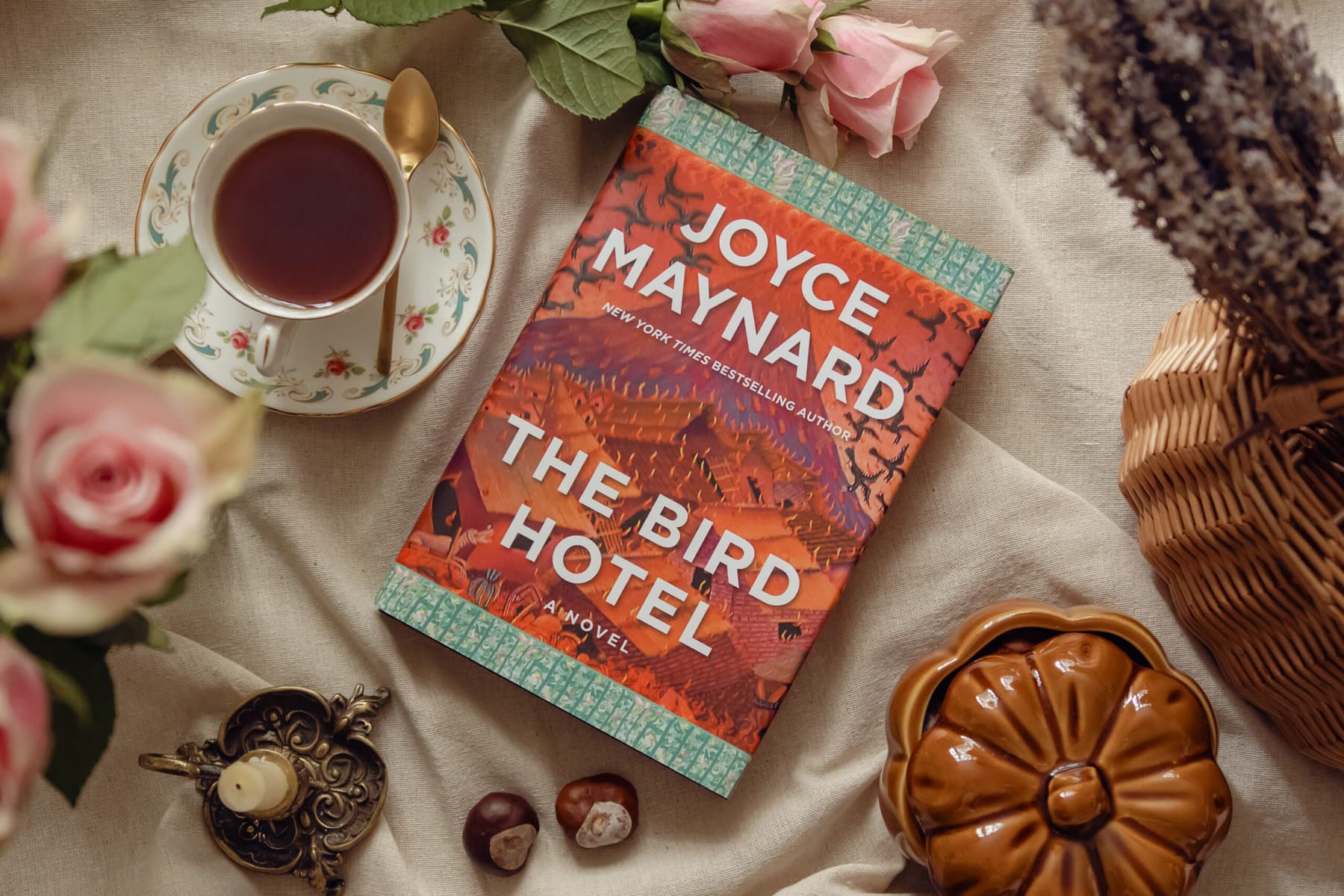The Bird Hotel: a spellbinding novel of healing and community
I only share books I know and love. If you buy through my links, I may earn a commission (learn more).

The Bird Hotel

Buy the book on Amazon, Audible, or Bookshop US
URL: https://amzn.to/48GRnlu
Author: Joyce Maynard
4.5
Buy the book on Amazon, Audible, or Bookshop US
Review of The Bird Hotel
“A person can start off fresh in this place,” Leila had told me that first night. “For anyone who ever wanted to escape their life, there’s no better hotel to check into than this one.”
The Bird Hotel by Joyce Maynard
Where do I start? After finishing The Bird Hotel – far from the warmth of the book’s setting, on the train from Copenhagen to the northern tip of Sweden – my overwhelming thought is that it’s a rare type of book; a novel that feels so richly of a place, or more precisely, the feeling of being in a place.
That place is La Esperanza, somewhere in Central America (and likely based on Lake Atitlán, Guatemala, where the author has made a part-time home and part-time living as an innkeeper).
But to zoom in, the novel’s central location – at least in my eyes – is the patio of La Llorona, the hotel at the heart of the book. When I think back to The Bird Hotel, I can perfectly picture sitting with a cup of coffee overlooking the lake as the sun rises, fishermen head out on their boats, and birds skim the water; just as our main character, Irene, did every morning.
It’s on this patio where Irene gets to know Leila, the innkeeper at the time of her arrival who will change everything for her. It’s also where she bonds with guests, meets with friends, discovers news both good and bad, and tracks her own evolution.
Above all, The Bird Hotel is a beautifully penned celebration of an anonymous yet crystal-clear location, as well as one woman’s journey to finding a place to belong and understand herself, her past, and the world.
That said, the book does not begin with beauty. Rather, the opening pages build up to the trauma (surrounding loss) upon which the story’s direction turns, as well as the messy and disorienting grief and reckonings of the person left behind.
After experiencing my own loss a couple of weeks ago – a miscarriage at ten weeks that I was struggling to wrap my head around – I wasn’t sure whether to continue reading. But as I did, I found some of my own clarity and healing, as well as a reminder of the power of confiding in others.
Without her traumatic start, Irene would never find herself guided – with a sprinkling of magical realism – to La Llorona, nor would the peace and tranquility seem so strikingly blissful.
The Bird Hotel is predominantly a book about what comes after loss, and in Irene’s case, that’s healing, self-discovery, and belonging. When Irene arrives at La Llorona, she’s told, “You don’t know it yet, but these birds will heal your heart.”
The hundred or so pages after Irene arrives at La Llorona are the most beautiful and evocative – and I adored these. But as the book reminds us, every Eden has its serpents. Betrayal, deception, and drama come to the surface, but ultimately – like the trauma in the opening pages – these are needed for the story to unfold as it does so well.
One of my main motivations for picking up The Bird Hotel was its touches of magical realism, and they are there, albeit subtly. It gives the book license for a number of coincidences that you might well roll your eyes at – or, like me, be perfectly happy with.
Likewise, a character reading and recommending Gabriel García Márquez at the hotel is a fairly obvious choice, but so what? (My love for García Márquez certainly contributes to my love for this book.)
A final point: travelling from our own countries to unspoilt paradises clearly has a darker side, which is readily explored in The Bird Hotel. What happens when white and relatively wealthier foreigners travel to such places – can there be positive impacts, and how can we mitigate the negative?
A similar question that Joyce Maynard acknowledges in the endnote is one of appropriation: namely, is it acceptable for a white woman to write about an indigenous community?
The gist of her answer is that she writes exclusively from the perspective of an outsider; as a white American woman who remains an outsider in the home she adopts.
Through a host of characters that span the spectrum of “good” versus “bad” white tourists, we’re left to ask these questions for ourselves.
Personally, I’m glad that Maynard chose the perspective she did, and stuck to it. And as Maynard reminds us, if fiction were restricted to our own perspectives and native lands, it would lose so much of its richness.
Read an excerpt
You can read an excerpt of The Bird Hotel here, or buy a copy of the book on Amazon, Audible, and Bookshop.org US.
